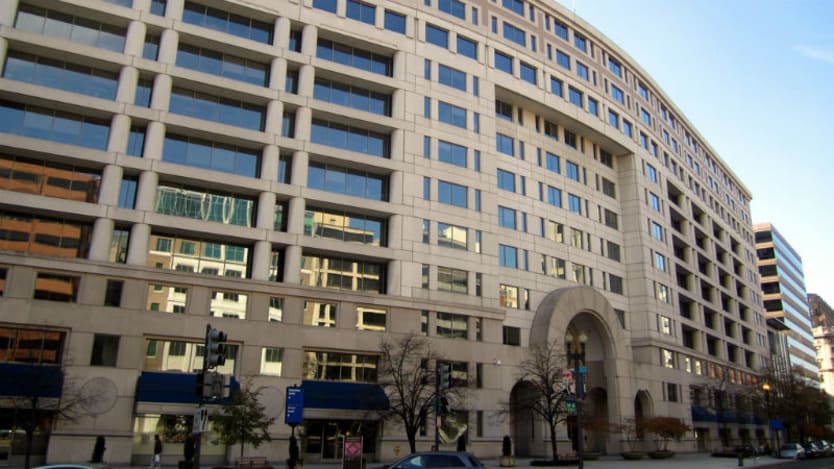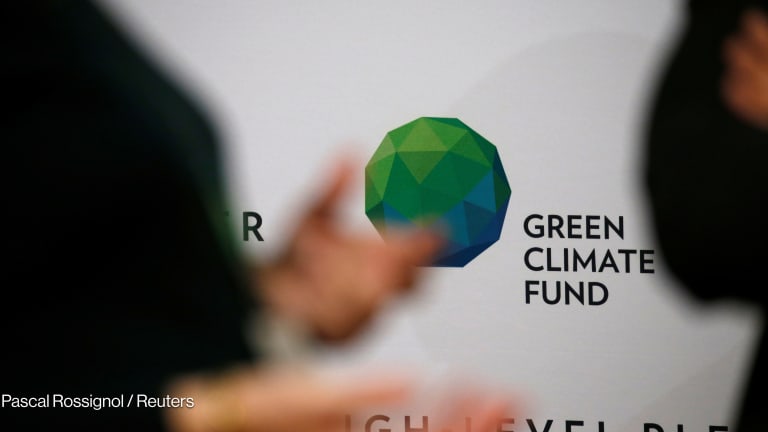UN Green Climate Fund sees nearly $840M worth of IDB projects lapse

MANILA — Two years ago, Argentina’s new ambitious renewable energy law received a multimillion-dollar boost from the world’s largest international climate fund. As the coal-dependent country struggled to promote renewables, the U.N. Green Climate Fund approved a $653 million project put forward by the region’s Inter-American Development Bank, $133 million of which was slated to come from GCF’s coffers.
“The fact that there’s [technically] three [lapsed projects] on IDB is not a coincidence because possibly we are still working out how to ensure that both institutions are in full compliance with their own policies.”
— Javier Manzanares, deputy executive director, GCFThe money, in turn, would help to encourage the private sector, “which has shown a lot of interest in the [renewable energy] markets,” Enrique Konstantinidis, a senior climate policy adviser at the Buenos Aires-based NGO Environment and Natural Resources Foundation, or FARN, told Devex in November.
But, unbeknownst to Konstantinidis and a handful of other climate change experts Devex consulted with, the project quietly lapsed this past July. In GCF parlance, that means the fund will no longer financially support the project in its current form, according to Javier Manzanares, deputy executive director at GCF.
Nor is it the only IDB project to have lapsed. Of the bank’s seven projects, worth a total of over $1.4 billion, two have already lapsed. In total, nearly $840 million worth of IDB projects have seen funding terminated in the past year.
The other project, which lapsed this past September, had a total investment of $185 million to promote energy efficiency in green bonds, first in Mexico, then in select countries throughout the region. GCF had agreed to contribute $22 million to it. Additionally, a third IDB project, one for the Eastern Caribbean was thought to have lapsed when the GCF secretariat incorrectly interpreted a board member's request for clarification about an extension request for the project as an objection. The matter was cleared up at the Bahrain board meeting two months ago.
Since GCF became fully operational in 2015, it has committed more than $4.6 billion to 93 projects with a combined value of over $16 billion. While the IDB projects are not the only ones to have lapsed at GCF — a $34.1 million project from the Development Bank of Southern Africa was the first, and only other, to have done so to date — they are the largest approved projects to do so.
That begs the question: How did a major multilateral development bank that was one of the first to be accredited to GCF, the first to have a large project worth over $180 million approved, and clearly no stranger to the expectations of climate funds, wind up with some $840 million worth of projects currently terminated? And what does this mean for the climate-vulnerable, economically turbulent countries that have been waiting years for the much-needed projects to begin?
“[Argentina] is relying on these funds,” stressed Konstantinidis, noting that this past August, the country’s central bank raised its benchmark interest rate to 60 percent, making it the highest in the world, in an attempt to stop the sharp decline in the value of the Argentine peso. “If the promises from this project are not met, it’s definitely going to be harmful.”
GCF often approves projects with conditions. In the case of the Argentina project, there was only one condition: that the Funded Activity Agreement, which is a legal agreement that needs to be signed before funds can be disbursed, include a stipulation that any financial advantage provided by GCF is passed on to the underlying projects.
Similarly, there was only one stipulation attached to the Mexico program, which was expected to have a total project value of $150 million: that the financial term sheet, which is not made public, outline the structure and conditions of IDB’s financial relationship with GCF for this specific project.
In both instances, after IDB obtained all the necessary final internal approvals, the bank was required to submit a certificate confirming this information to GCF within the allotted deadlines.
Mexico was intended to just be a pilot, and the board had more requirements as the program expanded to other countries in the region. Still, GCF’s board has arguably been lenient with IDB when compared to other accredited entities such as the U.N. Development Programme.
Indeed, UNDP’s projects frequently have a long list of conditions attached for approval. For instance, an $84 million climate change mitigation project in Ecuador, which, for perspective, is worth 10 percent of the IDB projects combined and was categorized by GCF as having lower environmental and social risks than both of the two lapsed projects, was approved with 14 conditions plus additional sub-conditions. And yet, the Ecuador project, along with 17 other UNDP projects at GCF, are already being implemented, according to the fund’s records.
By comparison: Of the five IDB-approved projects at GCF (excluding the two lapsed) none have yet to be implemented. So what happened?
Amal-Lee Amin, climate change director for IDB and the bank’s focal point for GCF matters, declined to elaborate on the lapsed projects, but through her staff issued the following email statement: “The GCF and the IDB Group have a robust partnership for climate action in Latin America and the Caribbean (LAC). As we move forward with our collaboration, we are finalizing the corresponding agreements for the implementation of our first set of joint projects, and the identification of new operations. We will continue working together towards a more climate resilient and low-carbon LAC.” Amin declined to respond to direct questions.
GCF documents reveal that in both cases before the deadline to submit the aforementioned certificates, IDB requested an extension and was denied, ultimately causing the projects to lapse. Several sources with knowledge of the discussions who requested not be named said that in the case of Argentina, IDB notified the GCF board that it wanted to transfer the project to the private sector arm of the IDB group, rebranded last year as IDB Invest.
But the request was not granted because GCF rules don’t allow for such a measure, nor was IDB Invest in fact accredited at the time, which is a requirement for any entity that wishes to put forward a project proposal to GCF. In the case of the Mexico project, the sources say that IDB and the GCF secretariat couldn’t agree on the length of the extension request. Amin declined to comment on these events.
“The fact that there’s [technically] three [lapsed projects] on IDB is not a coincidence because possibly we are still working out how to ensure that both institutions are in full compliance with their own policies,” GCF’s Manzanares told Devex.
Manzanares admitted that lapsed projects are “something that keeps on occurring because it’s part of our portfolio. You have a number of projects and unless the necessary documentation is signed, they lapse. That’s part of life.”
He added that one of GCF’s weaknesses is that the fund doesn’t have a policy for canceling or restructuring a project. “It was very hectic at [the last board meeting] so there was no time to consider this policy, but we will definitely present it at [the next board meeting] in February,” he said.
The lack of clear policies has arguably resulted in inconsistencies in the way that the GCF secretariat has handled projects submitted to the fund. But all is not lost.
Technically, IDB, or any accredited entity, with the support of Argentina and/or Mexico, could take the lapsed projects back to undergo secretariat due diligence and an independent technical assessment before coming to the board for re-approval. However, the project proposals will likely need to be altered, taking into account any changes since the projects were approved, most notably the price of renewables. Amin declined to comment on any future plans for the projects.
The board has not approved any other green bond project for Mexico, if there is even one in the pipeline. However, the country continues to show its strong commitment to the cause. This past September, Mexico signed the Green Bonds Pledge, declaring that all bonds financing long-term infrastructure and capital projects must address environmental impacts and climate risk.
Meanwhile, it is notable that this past February, the GCF board approved an IDB project that aims to promote renewables and energy efficiency investments in Argentina. The total project investment is roughly $164 million, which is substantial, but a far cry from its $653 million predecessor. The new project also has differences, namely that it will focus on small and medium-sized enterprises with Argentina’s national bank acting as the executing entity.
FARN’s Konstantinidis hopes that this time, the much needed-project will actually push through. “If not, IDB would be causing the private sector to lose trust in the government,” he cautioned, later adding, “I trust that’s not going to be the case.”
Search for articles
Most Read
- 1
- 2
- 3
- 4
- 5


